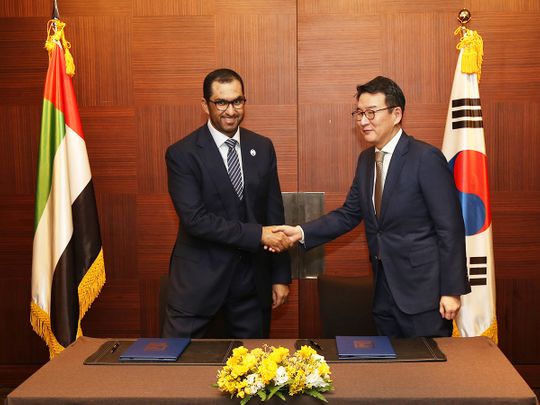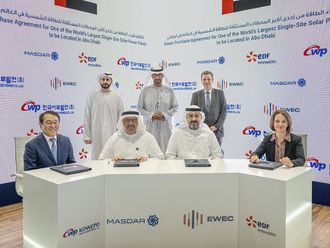
Abu Dhabi: Abu Dhabi National Oil Company (Adnoc) has signed three framework agreements with Korean energy companies to explore upstream exploration and production opportunities, potential downstream investments and bunkering opportunities for both crude oil and liquefied natural gas (LNG).
The development comes as His Highness Shaikh Mohammad Bin Zayed Al Nahyan, Crown Prince of Abu Dhabi and Deputy Supreme Commander of the UAE Armed Forces visits Korea to bolster ties between the two countries.
82 %
of South Korea’s oil supplies in 2017 came from the Middle EastAdnoc said the agreements have been signed with the Korea Gas Corporation (Kogas), the world’s second largest buyer of LNG, which has conducted a feasibility study on LNG bunkering at Fujairah port, the Korea National Oil Company (Knoc) as well as GS Energy.
Knoc has a 30 per cent stake in Adnoc’s Al Dhafra Petroleum company and is seeking to increase oil storage in the Republic of Korea by 24 million barrels until 2025 and GS Energy, an independent Korean energy company has a 10 per cent stake in Al Dhafra Petroleum and 3 per cent stake in Adnoc Onshore.
South Korea, was the world’s eighth-largest energy consumer in 2017. According to the IEA, it imported about 3 million barrels per day of crude oil and condensate.
“The UAE, Abu Dhabi and Adnoc have enjoyed excellent business relationships with the Republic of Korea and the growing links between Adnoc and Korean companies are a testament to the depth and importance of those relationships, which the leadership of the UAE is keen to enhance,” said Dr Sultan Ahmad Al Jaber, UAE Minister of State and Adnoc Group CEO.
“Our discussion explored domestic and international growth opportunities across a range of areas, including oil and LNG bunkering, meeting the Republic of Korea’s growing energy demands and attracting investment to our expanding upstream exploration and development operations and our downstream and gas expansion plans.
The Republic of Korea, also known as South Korea, was the world’s eighth-largest energy consumer in 2017. According to the International Energy Agency (IEA), it imported about 3 million barrels per day of crude oil and condensate, making it the fifth-largest importer in the world.
11 %
of that Middle East oil supply in 2017 came from AdnocIt is highly dependent on the Middle East for its oil supply, and the region accounted for more than 82 per cent of its 2017 crude oil imports, of which 11 per cent was supplied by Adnoc.
Korea is also the world’s third-largest LNG importer. According to its 13th Long-term Natural Gas Supply plan domestic natural gas demand, for power generation, is expected to reach 40.49 million tonnes (MMt) by 2031 — a 3 MMt increase over 2017 levels.
As part of the Republic of Korea’s efforts to become a major liquids storage and trading hub in northeastern Asia, Knoc, through joint ventures with other firms, has been building the country’s first commercial terminals for crude oil and petroleum products at Yeosu and Ulsan, which will hold a total capacity of 36.6 million barrels.
The country also holds strategic and commercial oil reserves for both crude oil and petroleum products. Knoc operates nine state — run strategic storage facilities with 146 million barrels of capacity.
As of March 2018, Knoc held 96 million barrels of strategic reserves, and about 27 million barrels of inventories are stored as international stockpiles under agreements between the Republic of Korea and other governments.












